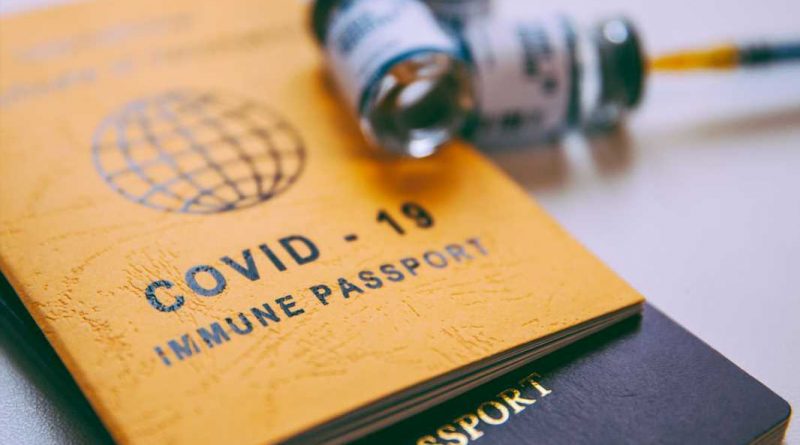Vaccine passports: What you need to know
With more people getting vaccinated every day, travelers are looking forward to a time when we won’t have to worry so much about boarding a full plane, staying in a hotel and all the other joys of traveling during a global pandemic.
Once again in its full stride, travel will be safer than ever thanks to new innovations in cleanliness, hygiene and touchless technology that resulted from pandemic travel needs.
Enter vaccine passports, which many are considering as the best way to ensure travelers are vaccinated before they set foot on a plane or enter a new country. And while the idea isn’t perfect, it’s a step in the right direction as we work toward a safer and healthier return to travel.
Here’s what we know about vaccine passports so far, why they’re considered to be controversial and how they could change the face of travel as we know it.
What are vaccine passports?
In this case, a vaccine passport would provide an efficient way for travelers to show border control officials and airline staff they’ve been inoculated against COVID-19, allowing them to skip quarantine.
Load Error
Instead of presenting an immunization card — which could be easily forged or tampered with — the information regarding your vaccine dosage and dates would be uploaded to a virtual portal or app that’s accessible via a scannable QR code at the airport, similar to an electronic boarding pass. Think of it as a virtual version of how visitors to certain parts of Africa, Central, and South America provide proof of a yellow fever vaccination with an International Certificate of Vaccination or Prophylaxis (ICVP), or “yellow card.”
“Vaccine passports may be an attractive option for countries or areas that want visitors but want to minimize the risk of visitors who could be carrying the virus during their trip,” said Dr. Scott Weisenberg, Director of Travel Medicine at NYU Langone Health. “Vaccinated travelers will be less likely to get ill with COVID-19 during travel, and emerging evidence suggests vaccinated people are less likely to spread the virus to others.”
While their main purpose is to record proof of vaccination, virtual vaccine passports could also be used to store other relevant medical information like COVID-19 PCR test results. The goal is to ensure the health and safety of those who are traveling as well as the well-being of the people living in the places being visited.
“The entire world has a ‘selfish’ interest in ensuring that everyone gets vaccinated, or the virus will continue to spread,” Weisenberg said. “We see this with measles and mumps, where we still have outbreaks despite widespread vaccination. In those cases it is often from vaccine hesitancy in well-resourced populations, but the same thing could happen when visiting under-protected populations.”
To prevent the spread of the virus, vaccination is key, as is not traveling until at least two weeks beyond the final dose when it’s considered to be most effective.
“This is a moving target, but potential travelers should try to get vaccinated as soon as it is their turn even if the destination location doesn’t require a vaccine passport,” said Weisenberg. “Vaccination will reduce the odds of getting sick and ending up in a hospital while traveling, and should be part of pre-travel planning if the vaccine is available to the traveler.”
Continuing to take the usual precautions throughout your trip is also important.
“Vaccinated people are much less likely to end up critically ill, but there is still some risk of getting sick (even if it is substantially lower),” said Weisenberg. “Particularly around unvaccinated people, it is important to maintain mask-wearing and social distancing.”
Who requires vaccine passports?
From larger efforts by airlines and countries to cities and tourist attractions hoping to keep guests and locals safe, vaccine passports are proving to be a growing trend.
Israel recently launched its Green Badge system, designed to keep track of vaccination information via QR code and prevent non-vaccinated individuals from participating in certain public activities. In Europe, a similar Digital Green Certificate has been proposed to help promote travel among those who have been vaccinated, received negative COVID-19 PCR test results, or have already fully recovered from Coronavirus.
China is taking things one step further, announcing recently that visitors would be able to return after proving they’d received a Chinese-made vaccine, a bold move given these are not widely available yet outside China.
Airlines have also been turning to vaccine passports, with Qantas Airways announcing in Nov. 2020 it would require passengers to show proof of vaccination.
Other international airlines like Emirates, Etihad Airways, Air New Zealand, Qatar Airways, Singapore Airlines, Copa Airlines, Thai Airways, Korean Air, ANA, and Malaysia Airlines are currently testing out the IATA Travel Pass, a digital health passport app that’ll store travelers’ negative COVID-19 PCR test results and vaccination status as a way to promote quarantine-free travel.
Alaska Airlines, American Airlines, Iberia, and British Airways are also trialing a similar app feature via VeriFLY on flights to and from participating airports.
CommonPass is currently being used by JetBlue on flights to Aruba, connecting passengers with accredited labs for pre-travel COVID-19 PCR tests, and uploading and tracking results. The app is also being used by those flying JetBlue, Virgin Atlantic, Lufthansa, United Airlines and Swiss International Air Lines from Boston, New York City, London and Hong Kong, while all three airline alliances — SkyTeam, Oneworld and Star Alliance — are looking into it as well.
When it comes to cruises, complications abound since vaccinations aren’t currently available for children under the age of 16, so it remains to be seen if major cruise lines will require a vaccine passport to set sail. The same goes for hotels, which haven’t yet required proof of vaccination before guests begin their stay, though theoretically apps like CommonPass could be used to present required documents.
Smaller cruise lines like the American Queen Steamboat Company, Victory Cruise Lines and Saga Cruises have all announced vaccination requirements, while other safety measures like COVID-19 PCR testing prior to boarding the ship as well as temperature checks, mask-wearing, and social distancing will still happen onboard.
New York is currently testing out Excelsior Pass to ensure the health and safety of those attending events at stadiums like Madison Square Garden and the Barclays Center, allowing proof of vaccination or recent negative COVID-19 PCR test results to be uploaded and tracked virtually.
CLEAR’s Health Pass app is also being tested on certain flights to Hawaii as well as at several museums and event venues as a way to track customers’ COVID-19 PCR test results and eventually, vaccine status.
How do I get a vaccine passport?
So far, vaccine passports are still in trial stages so they’re only available if you’re flying with certain airlines to participating airports and receive an invitation code.
Some companies, like CLEAR, let customers download the app so you’ll be ready to upload your COVID-19 vaccine status once that particular Health Pass feature officially launches. Of course, this is an ongoing situation, so checking in with your airline and staying on top of travel restrictions in the places you’re visiting is key.
As of this writing, it’s not yet known how countries, airlines, cruises, and other tourist attractions interested in vaccine passports will make exceptions for children under 16 who aren’t eligible for COVID-19 vaccines, and those who can’t be vaccinated due to allergies or other medical reasons.
Vaccine trials for kids are happening but it’s going to take a while and most countries reopening to vaccinated travelers aren’t counting unvaccinated children as safe, though this could change.
Why are vaccine passports controversial?
According to a spokesperson from the World Health Organization (WHO), it boils down to two things. It’s not clear how effective vaccines are in preventing the transmission of COVID-19, with more studies needed to determine if a fully vaccinated person can still carry the virus and infect others. On top of that, vaccine supplies around the world are pretty limited, so not everyone everywhere has an equal opportunity at getting theirs.
As Dr. Michael Ryan, Executive Director of the WHO’s Health Emergencies Programme, explained during a recent press conference, prioritizing vaccinations for people in wealthier countries means at-risk populations living in poorer countries are being left behind.
Dr. Chris Beyrer, an Epidemiology Professor at the Johns Hopkins Bloomberg School of Public Health, agrees. “The issue is that right now more than 100 countries have no vaccines for COVID-19, so it is a major inequality,” he said, adding that the effects of this could stretch beyond travel into other areas like student visas, leaving students from countries without access to vaccines at a disadvantage compared to those from countries with higher vaccination rates.
Bottom line
While it’s not a perfect system, vaccine passports may be a useful way for travelers to show proof of vaccination and negative COVID-19 PCR test results going forward. Hopefully, with enough time, testing, and ongoing vaccinations, they’ll prove to be an effective method for a safe return to quarantine-free travel worldwide.
For more travel guides, news and tips, make sure to subscribe to our email newsletter.
Chase Sapphire Preferred® Card
Chase Sapphire Preferred® Card
Earn 80,000 bonus points after you spend $4,000 on purchases in the first 3 months from account opening. That’s $1,000 when you redeem through Chase Ultimate Rewards®. Plus earn up to $50 in statement credits towards grocery store purchases within your first year of account opening.
Earn 2X points on dining including eligible delivery services, takeout and dining out and travel. Plus, earn 1 point per dollar spent on all other purchases.
Get 25% more value when you redeem for airfare, hotels, car rentals and cruises through Chase Ultimate Rewards®. For example, 80,000 points are worth $1,000 toward travel.
With Pay Yourself Back℠, your points are worth 25% more during the current offer when you redeem them for statement credits against existing purchases in select, rotating categories.
Get unlimited deliveries with a $0 delivery fee and reduced service fees on eligible orders over $12 for a minimum of one year with DashPass, DoorDash’s subscription service. Activate by 12/31/21.
Count on Trip Cancellation/Interruption Insurance, Auto Rental Collision Damage Waiver, Lost Luggage Insurance and more.
Get up to $60 back on an eligible Peloton Digital or All-Access Membership through 12/31/2021, and get full access to their workout library through the Peloton app, including cardio, running, strength, yoga, and more. Take classes using a phone, tablet, or TV. No fitness equipment is required.
Intro APR on purchases
N/A
Regular APR
15.99%-22.99% Variable
Annual Fee
$95
Balance Transfer Fee
Either $5 or 5% of the amount of each transfer, whichever is greater.
MORE INFO
Source: Read Full Article




